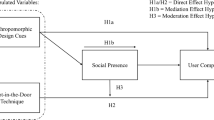Abstract
The aim of this study was to demonstrate the relationship between artificial intelligence (AI) bias and digital public diplomacy based on terminology use in three ChatGPT dialogues we initiated. AI bias is discursively constructed through rhetoric and narrative, presenting how users and algorithm designers perceive social reality. These elements of language then spread through Internet technology. This study examined the potential threat of AI bias in constructing knowledge in the digital age. Indeed, AI bias arising from terminology use can shake up the decision-making and communication practices of public diplomacy, especially the formulation and implementation of advocacy. We identified two potential types of bias: (a) the content provided by ChatGPT reflects a set of opinions with a particular orientation that does not account for the multiplicity of viewpoints on complex geopolitical issues, and (b) the answers given by generative AI tools tend to be affirmative views that are not subject to argumentation, justification, and reflection.


Similar content being viewed by others
Notes
Both “Tiananmen Massacre” and “Tiananmen Event” come from Western sources and have been censured by the Chinese government. Beijing has framed the event as a riot using phrases such as “counter-revolutionary riots” (The Central People’s Government of the People’s Republic of China 2009, para. 1), “riot” (para. 1), “the June 4 storm” (People’s Daily 2001, title), “the political storm at the turn of the spring and summer of 1989” (Economic Daily 2015, para.9), and “the political turmoil of 1989” (China Radio International 2007, para. 1).
References
Akter, Shahriar, Grace McCarthy, Shahriar Sajib, Katina Michael, Yogesh K. Dwivedi, John D’Ambra, and K.N. Shen. 2021. Algorithmic Bias in Data-Driven Innovation in the Age of AI. International Journal of Information Management 60 (10): 102387. https://doi.org/10.1016/j.ijinfomgt.2021.102387.
Atayde, Agata M. P., Sacha C. Hauc, Lily G. Bessette, Heidi Danckers, and Richard Saitz. 2021. Changing the Narrative: A Call to End Stigmatizing Terminology Related to Substance Use Disorders. Addiction Research & Theory 29 (5): 359–362. https://doi.org/10.1080/16066359.2021.1875215.
BBC. 2006. “France Launches World TV Channel,” December 6, 2006. http://news.bbc.co.uk/1/hi/world/europe/6215170.stm. Accessed 6 Dec 2022.
Buslón, Nataly, Atia Cortés, Silvina Catuara-Solarz, Davide Cirillo, and Maria José Rementeria. 2023. Raising Awareness of Sex and Gender Bias in Artificial Intelligence and Health. Frontiers in Global Women’s Health 4 (9): 970312. https://doi.org/10.3389/fgwh.2023.970312.
Caliskan, Aylin. 2023. “Artificial Intelligence, Bias, and Ethics.” In Proceedings of the Thirty-Second International Joint Conference on Artificial Intelligence, 7007–13. Macau, SAR China: International Joint Conferences on Artificial Intelligence Organization. https://doi.org/10.24963/ijcai.2023/799.
Charteris-Black, J. 2004. Politicians and Rhetoric: The Persuasive Power of Metaphor, 1st ed. Basingstoke: Palgrave Macmillan.
China Radio International. 2007. “China Firmly Opposes the Groundless Accusations Made by the United States against China over the 1989 Political Turmoil.” Archive.Org. June 5, 2007. https://web.archive.org/web/20200522195134/http://news.cri.cn/gb/1321/2007/06/05/1569@1620992.htm.
Corroyer, Grégory. 2018. Critiques du dialogue: Discussion, traduction, participation. Paris: Presses Universitaires du Septentrion.
Cull, Nicholas J. 2010. Public Diplomacy: Seven Lessons for Its Future from Its Past. Place Branding and Public Diplomacy 6 (1): 11–17. https://doi.org/10.1057/pb.2010.4.
Cull, Nicholas J. 2019. Public Diplomacy: Foundations for Global Engagement in the Digital Age. Cambridge, UK: Polity Press.
Diakopoulos, Nicholas. 2015. Algorithmic Accountability. Digital Journalism 3 (3): 398–415. https://doi.org/10.1080/21670811.2014.976411.
DiMaggio, Paul, Eszter Hargittai, Coral Celeste, and Steven Shafer. 2004. “Digital Inequality: From Unequal Access to Differentiated Use.” Edited by Kathryn M. Neckerman. Social Inequality, 355–400.
Economic Daily. 2015. “Biography of Comrade Wei Jianxing.” Economic Daily. August 17, 2015. http://paper.ce.cn/jjrb/html/2015-08/17/content_253802.htm.
Golan, Guy J., Ilan Manor, and Phillip Arceneaux. 2019. Mediated Public Diplomacy Redefined: Foreign Stakeholder Engagement via Paid, Earned, Shared, and Owned Media. American Behavioral Scientist 63 (12): 1665–1683. https://doi.org/10.1177/0002764219835279.
Guenduez, Ali A., and Tobias Mettler. 2023. Strategically Constructed Narratives on Artificial Intelligence: What Stories Are Told in Governmental Artificial Intelligence Policies? Government Information Quarterly 40 (1): 101719. https://doi.org/10.1016/j.giq.2022.101719.
Hancock, Jeffrey T., Mor Naaman, and Karen Levy. 2020. AI-Mediated Communication: Definition, Research Agenda, and Ethical Considerations. Journal of Computer-Mediated Communication 25 (1): 89–100. https://doi.org/10.1093/jcmc/zmz022.
Huang, Zhao Alexandre. 2022. A Historical-Discursive Analytical Method for Studying the Formulation of Public Diplomacy Institutions. Place Branding and Public Diplomacy 18: 204–215. https://doi.org/10.1057/s41254-021-00246-y.
Huang, Zhao Alexandre, and Rui Wang. 2023. An Intermestic Approach to China’s Public Diplomacy: A Case Study of Beijing’s COVID-19 Communication in the Early Stages. Journal of Communication Management 27 (2): 309–328. https://doi.org/10.1108/JCOM-04-2022-0042.
Johnston, Kim Amanda. 2018. Toward a Theory of Social Engagement. In The Handbook of Communication Engagement, ed. Kim Amanda Johnston and Maureen Taylor, 19–32. Wiley-Blackwell: Medford.
Kaplan, Andreas, and Michael Haenlein. 2019. Siri, Siri, in My Hand: Who’s the Fairest in the Land? On the Interpretations, Illustrations, and Implications of Artificial Intelligence. Business Horizons 62 (1): 15–25. https://doi.org/10.1016/j.bushor.2018.08.004.
Manor, Ilan, and Zhao Alexandre Huang. 2022. Digitalization of Public Diplomacy: Concepts, Trends, and Challenges. Communication and the Public 7 (4): 167–175. https://doi.org/10.1177/20570473221138401.
Markovich, Amiram, Kalanit Efrat, Daphne R. Raban, and Anne L. Souchon. 2019. Competitive Intelligence Embeddedness: Drivers and Performance Consequences. European Management Journal 37 (6): 708–718. https://doi.org/10.1016/j.emj.2019.04.003.
Ntoutsi, Eirini, Pavlos Fafalios, Ujwal Gadiraju, Vasileios Iosifidis, Wolfgang Nejdl, Maria-Esther. Vidal, Salvatore Ruggieri, et al. 2020. Bias in Data-driven Artificial Intelligence Systems: An Introductory Survey. Wires Data Mining and Knowledge Discovery 10 (3): e1356. https://doi.org/10.1002/widm.1356.
People’s Daily. 2001. “80 Major Events in the History of the Communist Party of China (72): The Political Storm of 1989.” Archive.Org. June 13, 2001. https://web.archive.org/web/20150209020541/http://www.people.com.cn/GB/shizheng/252/5301/5302/20010613/488133.html.
Russell, Stuart, and Peter Norvig. 2016. Artificial Intelligence: A Modern Approach, Global Edition. 3e édition. Boston Columbus Indianapolis New York San Francisco Upper Saddle River Amsterdam Cape Town Dubai London Madrid Milan Munich Paris Montreal Toronto Delhi Mexico City Sao Paulo Sydney Hong Kong Seoul Singapore Taipei Tokyo: Pearson.
Şimşek, Özgür. 2020. Bounded Rationality for Artificial Intelligence. In Routledge Handbook of Bounded Rationality, ed. Riccardo Viale, 338–348. London: Routledge.
The Central People’s Government of the People’s Republic of China. 2009. “Chronology of Events in the People’s Republic of China (1989).” The Central People’s Government of the People’s Republic of China. October 9, 2009. https://www.gov.cn/govweb/test/2009-10/09/content_1434332.htm.
The New York Times. 1989. “U.N. Panel Is Asked to Condemn China.” The New York Times, August 17, 1989, sec. World. https://www.nytimes.com/1989/08/17/world/un-panel-is-asked-to-condemn-china.html.
Vaassen, Bram. 2022. AI, Opacity, and Personal Autonomy. Philosophy & Technology 35 (4): 88. https://doi.org/10.1007/s13347-022-00577-5.
Vesnic-Alujevic, Lucia, Susana Nascimento, and Alexandre Pólvora. 2020. Societal and Ethical Impacts of Artificial Intelligence: Critical Notes on European Policy Frameworks. Telecommunications Policy, Artificial Intelligence, Economy and Society 44 (6): 101961. https://doi.org/10.1016/j.telpol.2020.101961.
Wever, Marcel, Alexander Tornede, Felix Mohr, and Eyke Hullermeier. 2021. AutoML for Multi-Label Classification: Overview and Empirical Evaluation. IEEE Transactions on Pattern Analysis and Machine Intelligence 43 (9): 3037–3054. https://doi.org/10.1109/TPAMI.2021.3051276.
Yang, Kai-Cheng., Onur Varol, Clayton A. Davis, Emilio Ferrara, Alessandro Flammini, and Filippo Menczer. 2019. Arming the Public with Artificial Intelligence to Counter Social Bots. Human Behavior and Emerging Technologies 1 (1): 48–61. https://doi.org/10.1002/hbe2.115.
Author information
Authors and Affiliations
Corresponding author
Additional information
Publisher's Note
Springer Nature remains neutral with regard to jurisdictional claims in published maps and institutional affiliations.
Rights and permissions
Springer Nature or its licensor (e.g. a society or other partner) holds exclusive rights to this article under a publishing agreement with the author(s) or other rightsholder(s); author self-archiving of the accepted manuscript version of this article is solely governed by the terms of such publishing agreement and applicable law.
About this article
Cite this article
Huang, Z.A. Terminology, AI bias, and the risks of current digital public diplomacy practices. Place Brand Public Dipl (2024). https://doi.org/10.1057/s41254-024-00324-x
Revised:
Accepted:
Published:
DOI: https://doi.org/10.1057/s41254-024-00324-x




